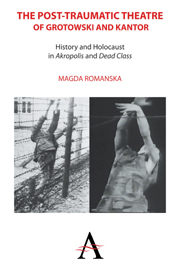 The Post-traumatic Theatre of Grotowski and Kantor
The Post-traumatic Theatre of Grotowski and Kantor from Part II - Our Memory: Kantor's Dead Class
Dead Class was not just Kantor's breakthrough, but unequivocally one of the most transformative theatrical events of the late 1970s, one of only a few theatrical pieces that captured the spirit of the century. Peter Brook famously said: “Dead Class was a great shock for me. This play contains the suffering of all of Europe. I think that theatre is nothing more than an attempt to condense everything in existence. Dead Class was just that: the experience of humanity condensed in one image.” Writing about Wielopole, Wielopole three years after the New York premiere of Dead Class, Margaret Croyden summarizes Kantor's impact on the international theatre scene:
[Kantor's] work is popular; he has played in almost every capital of the world, winning more than 15 international prizes and awards, and enjoying a splendid reputation. […] Those who see it experience something very special, painful perhaps, or astonishing, but an artistic phenomenon which cannot easily be dismissed or forgotten.
Despite the impact of Dead Class on the contemporary avant-garde (from Richard Foreman to Robert Wilson to Krystian Lupa), there's a surprising lack of in-depth scholarship about this work. The universal Kantor appealed to twentieth-century universal tastes and anxieties, but the Polish Kantor, like one of his vagabond artists, carried with him the entire baggage of national trauma and psychosis, the “hollow and sneering” laughter of his generation's ghosts.
To save this book to your Kindle, first ensure [email protected] is added to your Approved Personal Document E-mail List under your Personal Document Settings on the Manage Your Content and Devices page of your Amazon account. Then enter the ‘name’ part of your Kindle email address below. Find out more about saving to your Kindle.
Note you can select to save to either the @free.kindle.com or @kindle.com variations. ‘@free.kindle.com’ emails are free but can only be saved to your device when it is connected to wi-fi. ‘@kindle.com’ emails can be delivered even when you are not connected to wi-fi, but note that service fees apply.
Find out more about the Kindle Personal Document Service.
To save content items to your account, please confirm that you agree to abide by our usage policies. If this is the first time you use this feature, you will be asked to authorise Cambridge Core to connect with your account. Find out more about saving content to Dropbox.
To save content items to your account, please confirm that you agree to abide by our usage policies. If this is the first time you use this feature, you will be asked to authorise Cambridge Core to connect with your account. Find out more about saving content to Google Drive.